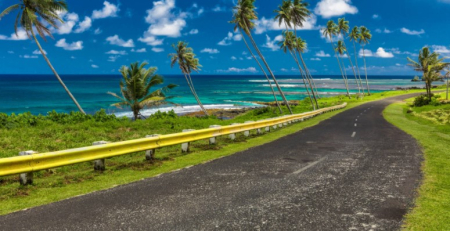
Posted by Gemma Preston, Paul Seeds, and Iulai Lavea [1]
Increased investment infrastructure investment is critical to driving sustainable development and economic growth in the Pacific. Over the next ten years, annual infrastructure investment needs in the Pacific region are estimated to be US$3.1 billion per year. However, this is against a backdrop of constrained fiscal space and increasing government debt as governments grapple with the response to the COVID-19 pandemic. Other challenges include geographic remoteness and dispersed populations that increase the cost of infrastructure in a region with significant vulnerability to natural disasters and climate change.
Overcoming these challenges will require countries to make smarter investments in infrastructure and improve infrastructure governance as well as the overall efficiency of government. Countries will need to spend better - not just spend more – with an emphasis on getting the most benefits for every dollar spent on public investment. The good news is that this topic was the centerpiece of a recent joint FAD-PFTAC virtual regional workshop hosted in late April and early May 2021.
The workshop explored ways to strengthen infrastructure governance using the IMF’s Public Investment Management Assessment (PIMA) Framework, with a special focus on those policies and institutions that are particularly relevant to small island economies in the Pacific region. The workshop also highlighted the importance of integrating climate considerations into infrastructure planning to build climate resilience, improve natural disaster responsiveness and unlock access to climate finance. The participants were introduced to the IMF’s new PIMA Climate Module.
Through interactive lectures, concrete examples of international practices and case studies, over 50 participants from eight countries[2] learned about the key elements of sound infrastructure governance. The workshop paid particular attention to project planning, appraisal, and selection; project prioritization and implementation; managing risks related to public investment; and infrastructure maintenance.
The workshop also benefited from four peer-led sessions:
- The Kiribati Ministry of Finance and Economic Development presented their experience of completing a PIMA. They had found it to be a useful tool to help identify gaps, update investment policies and build reform plans geared towards improving public investment effectiveness.
- The Ministry of Finance in Tonga described the process of appraising and selecting projects and the use of an appraisal checklist to ensure that the approach is applied consistently and incorporates key criteria in all assessments.
- The Cook Islands Ministry of Finance and Economic Management shared their experiences in accessing climate funds; this requires building national capacity and leveraging close working relationships with donors and international partners.
The main outcomes from the workshop were as follows:
- Participants gained a good understanding of the PIMA framework and how the framework could guide them in strengthening country practices.
- There was broad consensus on the importance of PIM institutions as a key to improving infrastructure outcomes.
- Countries identified with the need to integrate climate considerations into their infrastructure investment plans to build climate resilience; they also appreciated the contribution of the PIMA Climate Change Module as a new diagnostic tool.
- Countries expressed an interest in receiving further capacity development specifically on aspects of public investment .
The workshop was funded through the IMF’s new Infrastructure Governance Facility with the support of the Government of Japan.
[1] Gemma Preston is a Public Financial Management Advisor at the IMF’s Fiscal Affairs Department. Paul Seeds and Iulai Lavea are the Resident PFM Advisors at the Fund’s Pacific Finance and Technical Assistance Center (PFTAC).
[2] Samoa, Tonga, Fiji, Cook Islands, Kiribati, Tuvalu, Niue, Tokelau.
Note: The posts on the IMF PFM Blog should not be reported as representing the views of the IMF. The views expressed are those of the authors and do not necessarily represent those of the IMF or IMF policy.







